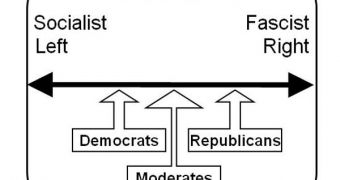A new scientific study conducted on people who believe that they are expressing popular beliefs has demonstrated that those who have extreme views are more inclined to share them than those who do not believe such a thing. The investigation has also revealed that these individuals still are more likely to express their opinion loudly than others, even when the perceived social support they think they are representing isn't actually there. The research helps clarify why extremists' discourses seem to dominate today's scene, as the ideas set forth by speakers to not resonate at all with each other, LiveScience reports.
The team in charge of the study admits that it conducted its inquiries only on college students, and only on a narrow range of subjects. Therefore, the conclusions may not be representative of the entire population. However, the experts maintain that the results are peculiar at best, and that further digging into this matter is needed. Such researches could help us decipher what exactly is it that the perceived social support attracts in extremist speakers, who would otherwise keep their mouths shut.
“When people with extreme views have this false sense that they are in the majority, they are more willing to express themselves,” Ohio State University Assistant Professor of Communication Kimberly Rios Morrison says. She is also the co-author of a new study detailing the finds, published in the latest issue of the Journal of Experimental Social Psychology. The expert says that, most likely, those who take a stand and appear extremist in their speeches are actually convinced that they represent the group.
In one of the experiments Morrison and Stanford University co-author Dale Miller devised, students were asked about their opinions on alcohol consumption. The researchers noted that those holding extreme views on the issue, be it either pro or against it, were most likely to express their points of view, even though, when surveyed about their alcohol preferences, most of the participants expressed the fact that they were moderate about it.
“Students who were stridently pro-alcohol tended to think that their opinion was much more popular than it actually was. They seemed to buy into the stereotype that college students are very comfortable with alcohol use,” Morisson adds. “There's this stereotype that college students are very pro-alcohol, and even most college students believe it. Most students think of themselves as less pro-alcohol than average,” she explains.
“Everyone else sees these extreme opinions being expressed on a regular basis and they may eventually come to believe their community is more liberal than it actually is. The same process could occur in moderately conservative communities,” the expert concludes.

 14 DAY TRIAL //
14 DAY TRIAL //